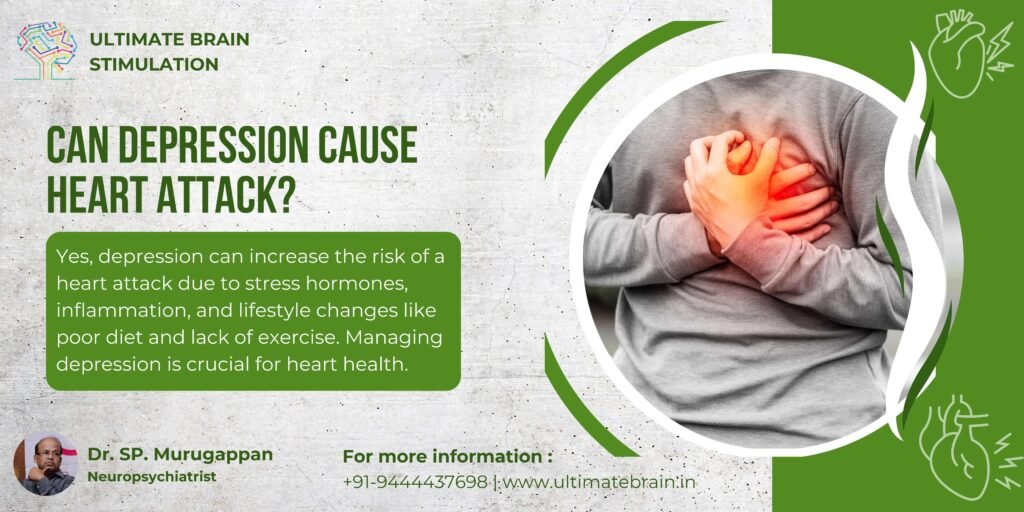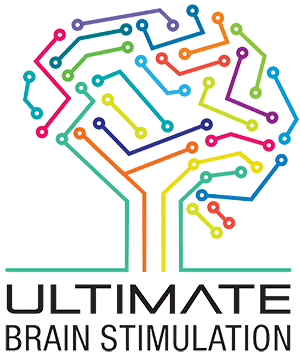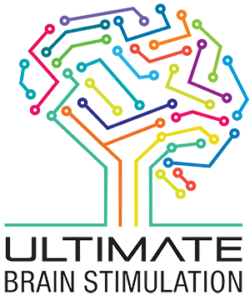Introduction
Welcome! My name is Dr. Murugappan and I’m in charge of the Ultimate Brain Stimulation Clinic in Chennai. “Can depression cause heart attack?” is an important health question I want to talk about today. This is an important subject because sadness doesn’t just affect your mood; it can also hurt your heart and other parts of your body. Let’s look at the specifics to find out how these situations are linked and what you can do about it.

Understanding Depression
Why do people get depressed
Biological Factors
- Changes in hormones: Problems with the thyroid or menopause can have an effect on mood.
- You are more likely to get depressed if someone in your family has had it.
Psychological Factors
- Low Self-Esteem: Being too hard on yourself can make you depressed.
- Traumatic or stressful events: Losing a loved one or having money problems can make you depressed.
Environmental Factors
- Being around violence, neglect, abuse, or poverty: these things make it easy for sadness to happen.
Symptoms of Depression
Emotional Symptoms
- Sadness, emptiness, or helplessness that won’t go away
- Not enjoying or being interested in most things
- Feelings of not being worth much or too much guilt
- Having suicidal or death thoughts
Symptoms in the body
- Lack of energy or feeling tired
- Changes in hunger (weight gain or loss)
- Sleep problems (insomnia or sleeping too much)
- Aches and pains in the body that don’t have a clear cause
- Symptoms of dementia
Cognitive Symptoms
- Having trouble focussing, remembering things, or making choices
- Slowing down of speech, thought, or body movements
Types of Depression
- Major Depressive Disorder (MDD) is a long-term sadness or lack of interest that gets in the way of daily life.
- Persistent Depressive Disorder: Dysthymia, or persistent sadness, is long-lasting depression that lasts at least two years.
- Bipolar Disorder: Bipolar disorder is when you have episodes of sadness and mania or hypomania that come and go.
- Seasonal Affective Disorder (SAD): People who have seasonal affective disorder (SAD) are depressed when the seasons change, usually beginning in the autumn.
- Postpartum Depression: A severe form of sadness that happens after giving birth.
Link Between Depression and Heart Health
Your heart can be affected by depression in a big way. It can change the way you act and look in ways that make you more likely to get heart disease. As an example, sadness can lead to
- Higher Stress Hormones: Cortisol levels that are too high can hurt your heart.
- More inflammation: Being depressed can make your inflammation level rise, which can hurt your heart.
- Bad Habits: Being depressed can make you eat poorly, not exercise, and smoke, all of which are bad for your heart.
It has been found that depressed people are more likely to get heart illness and have a heart attack. The numbers are scary, and they show how important it is to take care of mental health for everyone’s health.
Treatment Options for Depression
Medications
Antidepressants: There are various types, including SSRIs, SNRIs, tricyclics, and MAOIs. Finding the right medication can take time, but they can be very effective in managing symptoms.
Neuromodulation
When medications aren’t effective, neuromodulation can be an alternative. Techniques like rTMS (Repetitive Transcranial Magnetic Stimulation) and TDCS (Transcranial Direct Stimulation) are FDA-approved and have been proven safe for treating depression.
Lifestyle Changes
- Regular exercise: raises endorphins and makes you feel better.
- Healthy Diet: Eating foods that are high in nutrients can make you feel better.
- Adequate Sleep: Getting enough sleep is important for controlling symptoms and your health in general.
Mindfulness and ways to calm down
Meditation, yoga, and deep breathing movements are all good ways to lower stress and boost mood.
Psychotherapy
- Cognitive behavioural therapy (CBT): It helps change the way you think negatively.
- Interpersonal Therapy: IPT, or interpersonal therapy, focusses on making interactions better.
- Psychodynamic Therapy: This therapy looks at patterns and events from the past that aren’t aware.
Social Support
Making connections with family, friends, or support groups can help you feel less alone and give you mental suppor
Hospitalisation or treatment in a residential setting
In the worst cases, people may need to be hospitalised for special care.
Stress, Anxiety, and Depression
If you don’t deal with your stress right away, it can turn into anxiety and sadness. To stop these situations from getting worse, it’s important to find them and act on them quickly. Your family and friends are very important in this process.
Sleep Disturbances and Their Impact
People who are depressed often have trouble sleeping, which can make their symptoms worse. Some types of sleep problems are:
- Problems Falling Asleep: Having trouble falling asleep.
- Waking up and not being able to go back to sleep: sleep cycles that are broken.
- Restless Sleep: Moving around a lot while you sleep.
- Interrupted Sleep: Waking up several times at night.
- Non-Restorative Sleep: Not feeling refreshed after resting.
In conclusion
Not only does depression affect your mental health, it can also hurt your physical health, especially your heart. The first step to managing depression well is to learn about the signs, causes, and treatment choices. Don’t be afraid to ask for help if you’re having a hard time. Getting help early can keep problems from getting worse and make your life better.
FAQs
- Can depression directly cause a heart attack? Even though sadness doesn’t directly cause a heart attack, it can make people act and look in ways that make heart disease and heart attacks more likely.
- How can I reduce my risk of depression-related heart issues? You can lower your chance by dealing with stress, living a healthy life, getting help for depression, and going to the doctor for regular check-ups.
- What are the signs that my depression is affecting my heart health? Heart health problems like chest pain, shortness of breath, and palpitations, as well as sadness symptoms getting worse, could be signs of a problem.
- Are there specific treatments that address both depression and heart health? Yes, some treatments for sadness and heart health are the same. These include regular exercise, a healthy diet, mindfulness, and some medications.
- How can family and friends support someone with depression to prevent heart issues? Heart problems are much less likely to happen if you give them mental support, encourage healthy habits, and help them get professional help.
Make an Appointment Today!
Call us at(+91)9444437698!
For more information, visit Ultimate Brain Stimulation Clinic.
Connect on LinkedIn
Watch on YouTube.
Contact us on WhatsApp.
For additional wellness services, check out Silkee.

